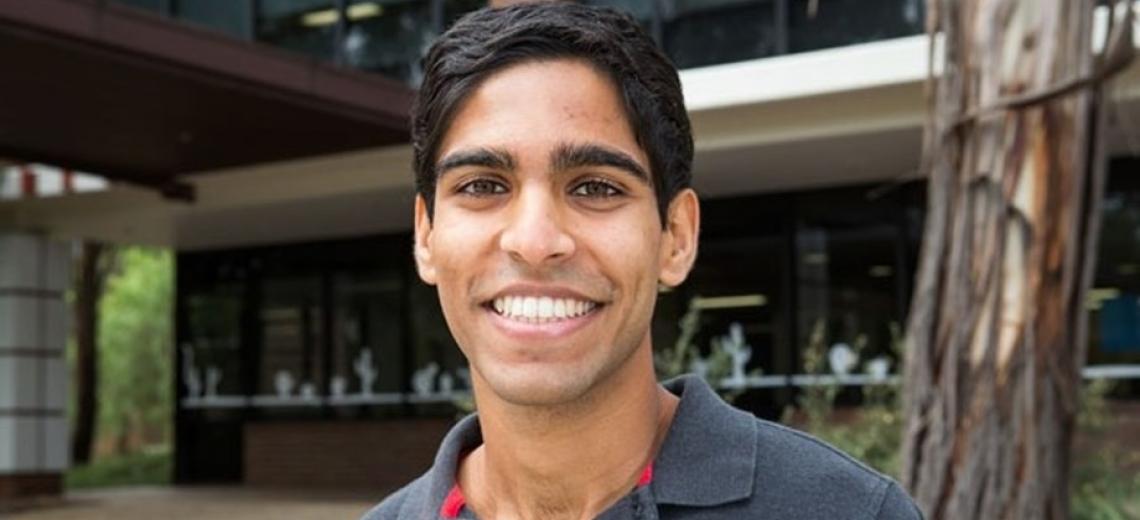
6 minute read
Before moving to The Australian National University (ANU), Matthew Jacob’s interests ran the gamut from studying inequality and public policy to long-distance running. They flourished at ANU, continuing to play a big part in his life today.
Since graduating, Matthew has worked at the frontier of research in applied microeconomics at Harvard University as a pre-doctoral fellow and now as a PhD candidate at Stanford University.
“ANU has been an integral part of my success so far. Moving to Canberra compelled me to make the most of opportunities on and off-campus. It’s hard to imagine a better environment in which to learn and grow after finishing high school,” shares Matthew, who grew up in a north-western suburb of Sydney.
He feels that there are two key factors that drew him to ANU: The prestigious Tuckwell scholarship that he received and a news article about UK cabinet members and their Oxford degrees, which encouraged him to explore the University’s unique Bachelor of Politics, Philosophy and Economics.
It’s hard to imagine a better environment [than ANU] in which I could learn and grow after finishing high school.
“I was attracted to the breadth of the degree and the relevance of the three disciplines to public policy,” Matthew says. However, his interests in economics and public policy led him to revisit the ANU College of Business and Economics (CBE), where he graduated with First Class Honours in Economics in December 2017.
“I’ve always felt the tools and frameworks in economics can shed light on important social problems and help design policies that address them. We are incredibly fortunate at CBE to learn from eminent scholars like Emeritus Professor Bob Gregory and Professor Bruce Chapman, who have made profound contributions to economic policy in Australia,” he shares.
Matthew feels he had several supportive communities at ANU, which were pivotal to his personal growth and academic success. For instance, the Tuckwell community; the lifelong friends he made at his University accommodation – Burgmann College; the ANU Debating Club; Raising Hope; and even the weekly Sunday yoga class at ANU gym he attended each providing balance and variety to complement his academic load.
“There were two other experiences at ANU that shaped me the most, professionally and personally. On the professional front, I interned at the office of Dr Andrew Leigh MP, Member of Fenner, which was my first real work experience and it gave me a unique insight into the mechanics of policy design and deliberation. Personally, it was completing ‘Inward Bound’, a unique footrace that is based on World War 2 survivalist training, a life-changing experience. Running is now a significant part of my daily routine,” Matthew shares proudly.
Completing a PhD was never on my mind. That changed during my honours year in economics at ANU.
At ANU, he believes that his passion to pursue research into inequality was “crystallised”.
“Completing a PhD was never on my mind. That changed during my honours year in economics when I came to realise the limitations of my knowledge and that completing a PhD in economics would be necessary in order to pursue my career aspirations. This realisation was affirmed during my Pre-Doctoral Fellowship at Harvard, which highlighted the tremendous potential for rigorous academic research to inform policy design and ultimately impact people’s lives,” he explains.
For the last two years, Matthew has worked at Opportunity Insights, an economics research group at Harvard. The group’s research focuses on inequality and upward mobility in the US, and on developing scalable solutions to enable people to achieve better life outcomes. In his role, he contributed to ongoing research on the importance of childhood environment on future outcomes like teenage birth rates, university enrolment, earnings in adulthood and incarceration. This research is currently used to help low-income families move to high-opportunity, affordable neighbourhoods.
Now at Stanford, he plans to further explore his research interests on inequality and intergenerational mobility with an Australian focus.
“One of the specific aspects I’m interested in is understanding the role of social networks and peers in shaping outcomes later in life. To date, research in this area has been limited, mainly as a result of data constraints. However, the advent of social media has given rise to new data sources, which may help shed light on these important questions,” explains Matthew, who sees himself returning to Australia after his PhD to work in the country’s economic policy space.
The ANU College of Business and Economics offers an extensive range of specialised programs in Economics. Click here for more details.
